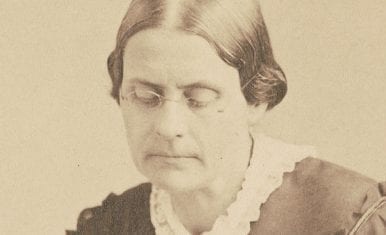
Happy 200th, Susan B. Anthony!
This Saturday, February 15, 2020 marks the 200th anniversary of woman’s rights advocate Susan B Anthony’s birth. Anthony is best known for promoting women’s rights and starting up the women’s suffrage in the United States. After the Civil War, Anthony and many other proponents of women’s suffrage argued that women as a class were protected by the language of the 14th amendment, which reads, “No State shall make or enforce any law which shall abridge the privileges or immunities of citizens of the United States.”
In 1872, Anthony put the principle to the test by voting in Rochester, New York in violation of state laws that restricted suffrage to men. She was arrested and at her trial, United States v. Susan B. Anthony in 1873 delivered a version of perhaps her most famous speech, “Is it a Crime to Vote?” to argue that “in thus voting, [she] not only committed no crime, but, instead, simply exercised [her] citizen’s right, guaranteed to me and all United States citizens by the National Constitution, beyond the power of any State to deny.” Anthony’s defense is both principled and measured, drawing on the fundamental political logic of both the Declaration and the Constitution of the United States. Here in honor of her birthday we present the opening passages: you can read the full text in our document library.
Is it a Crime to Vote?
Our democratic-republican government is based on the idea of the natural right of every individual member thereof to a voice and a vote in making and executing the laws. We assert the province of government to be to secure the people in the enjoyment of their unalienable rights. We throw to the winds the old dogma that governments can give rights. Before governments were organized, no one denies that each individual possessed the right to protect his own life. liberty and property. And when 100 or 1,000,000 people enter into a free government, they do not barter away their natural rights; they simply pledge themselves to protect each other in the enjoyment of them, through prescribed judicial and legislative tribunals. They agree to abandon the methods of brute force in the adjustment of their differences, and adopt those of civilization.
Nor can you find a word in any of the grand documents left us by the fathers that assumes for government the power to create or to confer rights. The Declaration of Independence, the United States Constitution, the constitutions of the several states and the organic laws of the territories, all alike propose to protect the people in the exercise of their God-given rights. Not one of them pretends to bestow rights.
“All men are created equal, and endowed by their Creator with certain unalienable rights. Among these are life, liberty and the pursuit of happiness. That to secure these, governments are instituted among men, deriving their just powers from the consent of the governed.”
Here is no shadow of government authority over rights, nor exclusion of any from their full and equal enjoyment. Here is pronounced the right of all men, and “consequently,” as the Quaker preacher said, “of all women,” to a voice in the government. And here, in this very first paragraph of the declaration, is the assertion of the natural right of all to the ballot; for, how can “the consent of the governed” be given, if the right to vote be denied. Again:
“That whenever any form of government becomes destructive of these ends, it is the right of the people to alter or abolish it, ad to institute a new government, laying its foundations on such principles, and organizing its powers in such forms as to them shall seem most likely to effect their safety and happiness.”
Surely, the right of the whole people to vote is here clearly implied. For however destructive in their happiness this government might become, a disfranchised class could neither alter nor abolish it, nor institute a new one, except by the old brute force method of insurrection and rebellion. One-half of the people of this nation to-day are utterly powerless to blot from the statute books an unjust law, or to write there a new and a just one. The women, dissatisfied as they are with this form of government, that enforces taxation without representation,-that compels them to obey laws to which they have never given their consent,-that imprisons and hangs them without a trial by a jury of their peers, that robs them, in marriage, of the custody of their own persons, wages and children,-are this half of the people left wholly at the mercy of the other half, in direct violation of the spirit and letter of the declarations of the framers of this government, every one of which was based on the immutable principle of equal rights to all. By those declarations, kings, priests, popes, aristocrats, were all alike dethroned, and placed on a common level politically, with the lowliest born subject or serf. By them, too, me, as such, were deprived of their divine right to rule, and placed on a political level with women. By the practice of those declarations all class and caste distinction will be abolished; and slave, serf, plebeian, wife, woman, all alike, bound from their subject position to the proud platform of equality.
The preamble of the federal constitution says:
“We, the people of the United States, in order to form a more perfect union, establish justice, insure domestic tranquility, provide for the common defense, promote the general welfare and secure the blessings of liberty to ourselves and our posterity, do ordain and established this constitution for the United States of America.”
It was we, the people, not we, the white male citizens, nor yet we, the male citizens; but we, the whole people, who formed this Union. And we formed it, not to give the blessings or liberty, but to secure them; not to the half of ourselves and the half of our posterity, but to the whole people-women as well as men. And it is downright mockery to talk to women of their enjoyment of the blessings of liberty while they are denied the use of the only means of securing them provided by this democratic- republican government-the ballot.



